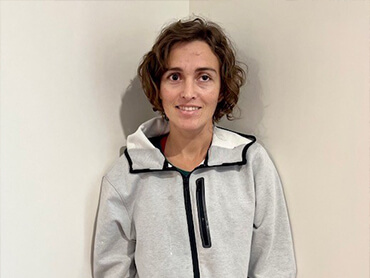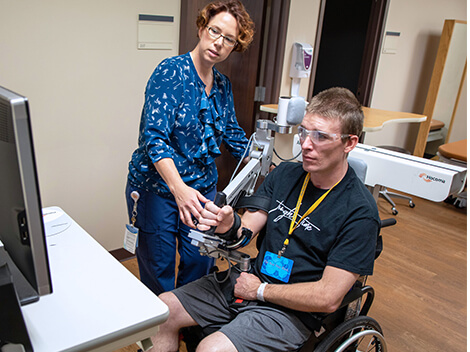Brain Injury Rehabilitation
Recovering from brain injury begins with trusting the choice of where you go for treatment.
We care for more than 12,000 people impacted by a brain injury each year. We help them recover and regain function to live as independently as possible.

Expert care
All brain injuries are different.
We know the challenges in recovery differ for each survivor and family, too.
In our rehabilitation hospitals, you’ll find compassionate and comprehensive care to help in the recovery process.
Our medical and clinical care teams see each patient as an individual with unique needs. This brings an exceptional focus to our care delivery. We treat traumatic and non-traumatic brain injury with specialization in the core areas of speech, mobility and cognitive rehabilitation. We also treat the mental, emotional and behavioral aspects.
Our goal is to help patients recover as much of their abilities and independence as possible. This begins the moment you or a loved one comes into our care and continues for the length of your stay.
-
Treating brain injury is a team effort. Our teams are led by physicians certified in physical medicine and rehabilitation.
Nursing, therapy and clinical specialists assess what each patient needs and creates a personal care plan. Teams are trained in all areas of care needed to improve quality of life after a brain injury.
We consider family members part of the care team. It’s important family be involved in therapy sessions to learn about treatment and share in care decisions. If the decision is for the patient to return home, we teach families how to provide care before hospital discharge.
-
We personalize rehabilitation with a care plan unique to each patient to help:
- Improve alertness
- Achieve better sleep/wake cycles
- Augment cognitive/thinking
- Regain speech and language skills
- Manage changes in behavior
- Improve balance
- Manage pain
- Regain swallowing ability
- Improve performance of daily activities
- Address mental and emotional shifts
- Return to home, work, school and community activity
-
Our hospital teams work with you, your family and the referring hospital when bringing patients into our program.
We ensure each patient can do a five-day-a-week schedule of therapy for minimum of three hours per day. This includes physical, occupational and/or speech-language therapy.
Our program is designed for long-term recovery. While not every patient will need all treatments, some of the most common include:
- Training for safe sitting, standing, walking
- Exercises to strengthen arms and legs
- Assistive robotics for mobility
- Speech-language therapy
- Vision therapy to improve eye movement and gaze
- Daily living tasks for dressing, eating and bathing
- Exercises for memory, concentration and problem-solving
- Medication management
- Caregiver education and training
Before discharge, we'll arrange for any equipment needed in the home. We can also help find community resources that may be available. Our goal is to give patients and their families support for long-term recovery.

Technology and research drive recovery
We use hands-on treatment along with advanced medical technologies. The two build a bridge between re-engaging the body and brain. This lets us more fully treat all types and severities of brain injury.
Some of the technologies used include:
- Body weight-supported exercise treadmills
- Robotic devices that sense body movement to transition from treadmill to walking freely
- Robotic-assistive arm therapy to improve grasp and function
- HD touchscreens to help hand movement, reaction time and visual skills
- Muscle stimulation to increase movement and reduce atrophy
- Non-invasive stimulation therapy, applied to the neck, to treat swallowing disorders
- Adaptive video game controllers and joysticks to build muscle memory and hand dexterity
Research is also part of our patient care. At the core, our studies help evaluate new treatments. Through our research we have evidence for new therapies that help patients recover faster and more fully.